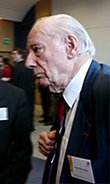The primary data of the Eurobarometer series on microdata level and the related documentation are placed at the disposal of the scientific community for research and training since the 1970s. They are curated at the GESIS Survey Data Curation department (formerly Data Archive department / Central Archive for Empirical Social Research) and at the Interuniversity Consortium for Political and Social Research (ICPSR). They are made available in the long term and worldwide for re-use in statistical analysis.
The Eurobarometer program was launched and initially managed by Jacques-René Rabier, head of the Commission's press and information directorate and afterwards special advisor to the Commission of the European Communities. In doing so, he then counted with the political support of the European Parliament (Wilhelmus Schuijt: Report on the information policy of the European Communities, 7 February 1972) and the close co-operation of Ronald Inglehart. The political scientist at the University of Michigan was then just developing his theory of value change in modern societies and his materialist/post-materialist items would become integral part of the Eurobarometer until the mid nineties.
Three pilot studies were conducted in 1970, 1971 and 1973 under the header of European Communities Studies; the five-countries-survey "Attitudes towards Europe" can be seen as an early forerunner already in 1962. The first actual Eurobarometer, conducted in spring 1974, is unfortunately only known from a few hectographed pages with tables...
Commendably, the Commission soon decided to place Eurobarometer primary data at the disposal of the scientific community for secondary use, leaving the responsibility for their long-term usability to the Social Science data archives. In Europe the original data were initially archived by the Belgium data archive BASS, since the early nineties by the Central Archive, today GESIS - Leibniz Institute for the Social Sciences. Data processing and documentation for secondary use was for the first two decades assumed by the ICPSR in Michigan, turning out a cooperation endeavour with the Central Archive in 1992.
From 1987 to 1996 the Eurobarometer program was continued and enlarged under the direction of Karlheinz Reif, since 1993 together with Anna Melich.
Anna Melich took over the Eurobarometer direction from 1997 to 1999, by then still within the organizational framework of the former Directorate-General X, Public Opinion Surveys and Research Unit. In 2000/2002 Eurobarometer were intermittently conducted in the framework of the DG Education and Culture, Citizens' Center - Analysis of Public Opinion under the direction of Harald Hartung, and starting with Eurobarometer 54 under the DG Press and Communication, initially directed by Thomas Christensen. Since 1999 the organisation and supervision of the surveys were consecutively executed by Rubén Mohedano-Brèthes (until 2002) and Renaud Soufflot de Magny (until 2006), with Antonis Papacostas as head of the Eurobarometer department between 2003 and 2010.
The Eurobarometer public opinion surveys are currently conducted on behalf of and coordinated by the European Commission, Directorate General Communication (COMM.A.3.: Media Monitoring and Eurobarometer), with Oana Hriscu as head of the unit and Roberto Santaniello as head of the Eurobarometer sector. The special topic modules are requested by the respectively responsible EC Directorate General.
Since 2007 the European Parliament is commissioning its own survey ("Parlemeter") through the Public Opinion Monitoring Unit of the European Parliament, in close cooperation with the DG COMM unit and within the same survey framework.

EC DG COMM - Eurobarometer logo (withdrawn from regular use)

EC DG X - Eurobarometer logo 1993-1999

Jacques-René Rabier at the Eurobarometer 35th Anniversary conference, Paris 2008.
Interview (2002-02-08)